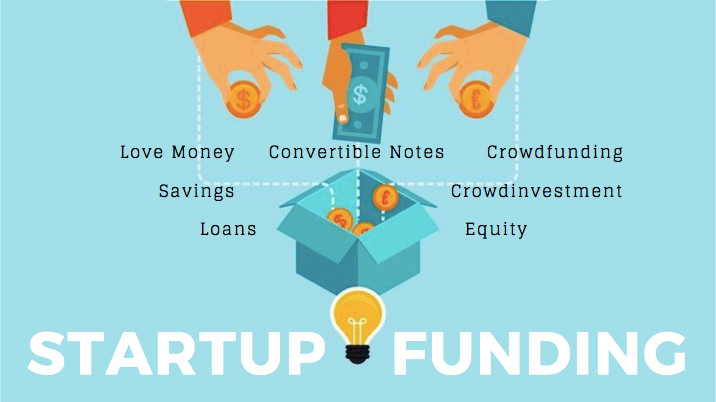Introduction
The term startup capital refers to the money raised by a new company in order to meet its initial costs. There are many sources of capital for entrepreneurs.
Startup capital usually comes from professional investors.
Seed capital, on the other hand, is often provided by close, personal contacts of a startup’s founder such as friends, family members, and other acquaintances.

Sources of Capital for Entrepreneurs
Finding sources of finance can be tricky and, at times, elusive. So, there are some of the sources of capital provided in the market.
Bootstrapping
When starting a business, you can choose to make a personal investment. This may include your savings or other assets you have. Also, other people may not be willing to give you money if you aren’t willing to invest in yourself.
 Sometimes, the unwillingness to invest in yourself conveys that you aren’t committed to your venture or that you don’t believe in its ability to be successful.
Sometimes, the unwillingness to invest in yourself conveys that you aren’t committed to your venture or that you don’t believe in its ability to be successful.
Angel Investor
An angel investor is a wealthy person or retired company executive who wants to make a direct investment in a small firm or startup company.
Usually, angel investors are considered leaders or experts in a specific niche or field. They contribute with the network of contacts they have gained through the years and their hands-on experience. Angel investors may also offer management and technical knowledge.
Here is what angels particularly care about:
- The quality, passion, commitment, and integrity of the founders
- The market opportunity being addressed and the potential for the company to become very big
- A clearly thought out business plan, and any early evidence of obtaining traction toward the plan
- Interesting technology or intellectual property
- An appropriate valuation with reasonable terms (angel investors are investing at an early stage when risk is highest, so they typically require lower valuations to compensate)
- The viability of raising additional rounds of startup funding if progress is made.
Venture Capital
Venture capital isn’t right for all entrepreneurs. From the very start, venture capitalists have been searching for tech-driven companies with huge growth potential.
Most venture capitalists will also take some equity from the business. Also, venture capitalists expect to see a significant return on the investment they make. If you choose to go this route, be sure you search for investors who have knowledge and experience in your industry or field.

The key terms negotiated in a venture financing deal include:
- Valuation of the company
- Amount of the investment
- Form of the investment
- Liquidation preference of the equity investment
- Board of Directors composition and any Board observer rights
- Approval or “veto” rights of the investors, covering items such as future equity financing, sale of the company, or changes to charter documents
- Rights to participate in future financing
- Rights to receive periodic financial reports and other information
- Vesting requirements for any founder stock
- Anti-dilution protection, protecting the investment from dilution if future rounds of financing occur at a reduced valuation (there are different types of formulas for this)
Government Subsidies and Grants
Some government agencies offer financing, such as subsidies and grants that your business may qualify for. You can find an entire listing of these opportunities online.
It’s worth mentioning that getting a grant can be challenging, and there is typically a lot of competition. The criterion for the grant is often stringent, too.
Crowdfunding
As the name implies, crowdfunding is when you get funding from crowds, which means the general public. Usually, an entrepreneur will use this option if they develop a product that is needed by people and not available anywhere else.
The key to successful crowdfunding campaigns is to have a compelling story about your product, service, or company, and to offer a meaningful reward for donations. Some startups have been able to raise thousands to even millions of dollars via crowdfunding campaigns. A crowdfunding campaign can also work to build a community of people interested in your company or products, and provides a sense of engagement for the donor.

Rewards-based crowdfunding is a particularly attractive option for startups, as you are not giving away equity or part ownership in your company—you are just offering some of your products or services, or a discount on those products or services.
Equity crowdfunding, a scenario in which you are selling stock or some other interest in your company in exchange for cash, requires strict compliance with federal and state securities laws, and you should not attempt to do this without help from a lawyer with relevant experience.
Bank Loans
These offer several benefits and customized repayment schedules. It is a good idea to shop around and find the right lender in this situation.
Invoice Financing
Unlike bank loans, invoice financing doesn’t require much time in business. With this option, you get a portion of your outstanding invoice value advanced.
To utilise this option, you must have a minimum of one invoiced customer; however, you don’t have to have much time in business to qualify.
Equipment loans
Small businesses can buy equipment through an equipment loan. This typically requires a down payment of 20% of the purchase price of the equipment, and the loan is secured by the equipment itself. Interest on the loan is typically paid monthly and the principal is usually amortized over a two- to four-year period. In addition to equipment, these loans can also be used to buy things such as vehicles and software. Loan amounts normally range from $5,000 to $500,000, and can accrue interest at either a fixed or variable rate. Equipment loans can also sometimes be structured as equipment leases.
Incubators
An incubator is an organization, company, or university that will provide you with resources for your startup company. The resources may include cash, consulting, marketing, laboratories, office space, or anything else you may require for operations.
Family and Friends
When it comes to sources of finance for your business venture, proceed with caution if you choose this one.
You can ask for a loan from your friends, parents, spouse, or other family members. Bankers call this “patient capital.” It is money that is repaid once your business becomes profitable.
If you decide to borrow money from family and friends, there are a few things to remember:
- They may want equity in your business
- Sometimes they don’t have as much capital to give
- Business relationships with family and friends need to be taken seriously
This isn’t right for everyone because if you cannot repay these people, there may be hard feelings.
Small Business Association Microloans
When it comes to sources of finance for small and startup companies, turning to the Small Business Association (SBA) is a popular option. The SBA microloan program partners with intermediary, nonprofit, and community-based lenders to provide borrowers with loans.
The loans have interest rates that arrange between 8 per cent and 13 per cent. The term lengths of the loans never surpass six years.
Along with funding, the SBA works with you as a mentor. This helps ensure that the business has the best chance of success possible.
Conclusion
The above mentioned ways are some of the sources through which an entrepreneur can arrange funds for its ventures.





